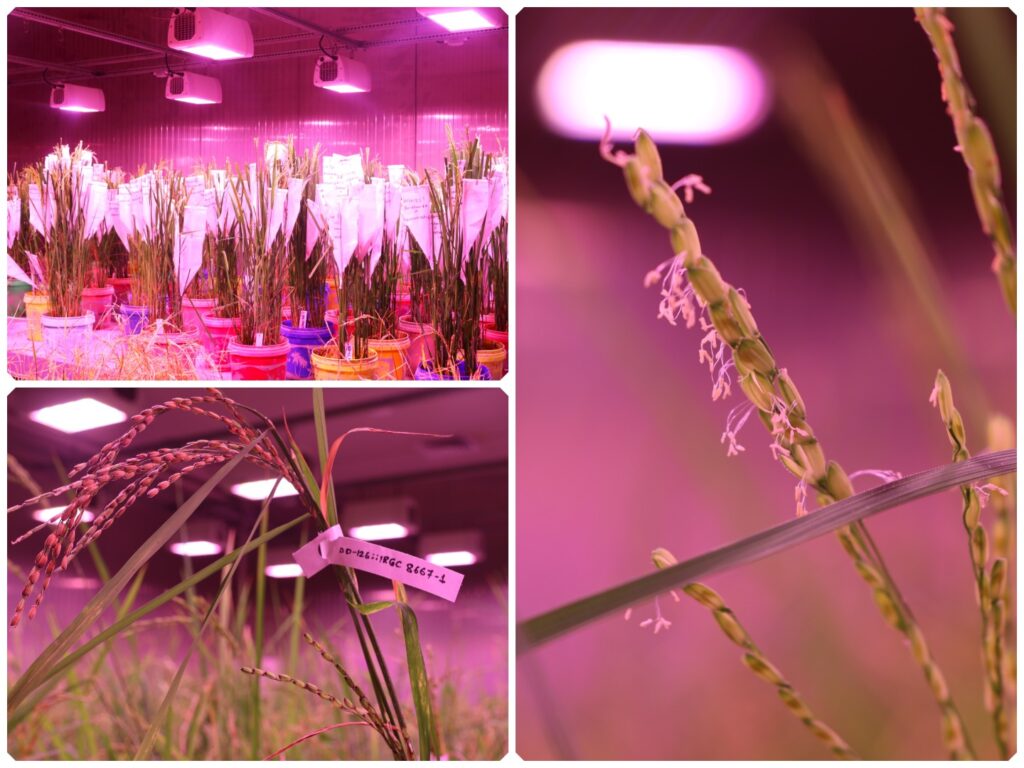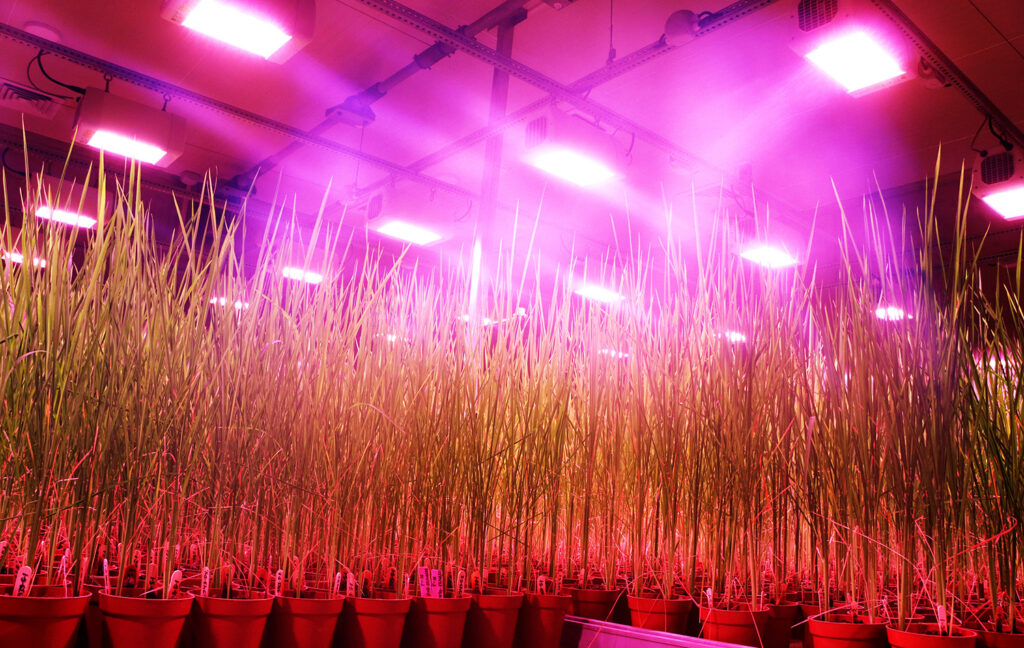IRRI scientists introduce Speed Breeding 3.0 to accelerate climate-resilient crop innovation with OneCGIAR
By Pramod Gorakhanath Kabade, Uma Maheshwar Singh, Pallavi Sinha, Vikas Kumar Singh, et al. Building on the success of pioneering protocols such as SpeedFlower, the International Rice Research Institute (IRRI) recently introduced Speed Breeding 3.0, a more comprehensive, inclusive, and adaptable framework designed for all crops, regardless of their growth cycle. This advanced strategy represents a critical initiative in

IRRI scientists introduce Speed Breeding 3.0 to accelerate climate-resilient crop innovation with OneCGIAR
By Pramod Gorakhanath Kabade, Uma Maheshwar Singh, Pallavi Sinha, Vikas Kumar Singh, et al.

Building on the success of pioneering protocols such as SpeedFlower, the International Rice Research Institute (IRRI) recently introduced Speed Breeding 3.0, a more comprehensive, inclusive, and adaptable framework designed for all crops, regardless of their growth cycle. This advanced strategy represents a critical initiative in support of OneCGIAR’s overarching goal to unify capabilities, knowledge, and resources, delivering more relevant, impactful, and integrated science to address climate change and ensure global food security.
Outlined in the newly published manuscript “Speed Breeding 3.0: Mainstreaming Light-Driven Plant Breeding for Sustainable Genetic Gains,” in Trends in Biotechnology Journal (IF:14.3), the protocol surpasses the limitations of earlier approaches (Speed Breeding 1.0 and 2.0).
The core of Speed Breeding 3.0: precision, acceleration, and democratizing innovation
Speed Breeding 3.0 leverages advanced photobiological tools to precisely control environmental parameters, including light spectrum, intensity, photoperiod, temperature, and hormonal regulation. This meticulous control allows for accelerated plant growth and development, enabling breeders to achieve up to six crop generations per year in vital crops like wheat, rice, and barley. This is a significant increase over the one or two cycles typically achieved through conventional methods.
Unlike its predecessors, which primarily focused on extended photoperiods for long-day crops or specific enhancements, Speed Breeding 3.0 is designed for broader adaptability. It can accommodate larger populations and a wider diversity of germplasm, including landraces, wild relatives, and breeding lines with variable growth durations. This expanded capability is achieved by integrating fundamental understanding in speed breeding with customized, stage-specific light recipes, and the strategic application of various growth parameters to synchronize growth and induce flowering. This innovative approach maximizes the efficiency of breeding programs, accelerates genetic gains, and promotes inclusive, sustainable crop improvement.
“Speed Breeding 3.0 is a game-changer. It integrates advanced strategies to develop robust protocols for short-day, long-day, and day-neutral crops across both C3 and C4 species. By synchronizing growth and employing customized light recipes, it accelerates the improvement of diverse crop species, including inbred lines, breeding lines, landraces, and wild relatives. This approach boosts breeding program efficiency, enhances genetic diversity, enables efficient combination of complex traits, and expands genetic gains like never before,” said South Asia Breeding Lead, Dr. Vikas Kumar Singh.
A comprehensive toolkit for crop improvement
Speed Breeding 3.0 is not merely about speed; it integrates a suite of advanced tools and strategies to create a holistic breeding platform.
Breeding with the speed of climate change
To meet the current and future needs of farmers and consumers, breeding with the speed of climate change and enhanced genetic gains are the prime targets of the breeding program. In this context, IRRI’s OneRice breeding strategy is one of the classic examples of combining breeding innovations to develop the next generation of varieties faster. Pre-breeding lines developed via routine marker-assisted breeding experiments are still time intensive, requiring 3–4 years to develop the new breeding lines that carry superior haplotypes in elite genetic backgrounds. To match the speed of the breeding cycle, the supply of pre-breeding lines before the initiation of a new breeding cycle is a must.
Adopting speed breeding technologies in pre-breeding programs can accelerate the development of pre-breeding lines in less than 2 years, aligning new sets of lines with product concepts before a new breeding cycle begins. Dedicated speed breeding protocols are needed for backcross breeding within pre-breeding programs to enhance vegetative growth and panicle formation. Currently, CGIAR’s breeding cycle takes 5–6 years, reduced to 3–4 years with Rapid Generation Advance (RGA). Speed breeding can cut this to 2 years, achieving the F5 stage in less than 2 years. Integrating speed breeding with genomic selection shortens breeding cycles and enhances selection intensity and accuracy of breeding programs.
Speed breeding 3.0 strategies
SpeedEdit (accelerating trait stacking for climate-smart crops)
This component seamlessly integrates speed breeding with advanced genome editing technologies, such as Multiplex Genome Editing (MGE), gene drive and CRISPR/Cas9. SpeedEdit facilitates precise and rapid genetic modifications, accelerating the introduction of complex traits using MGE tools like BREEDIT, enabling efficient trait stacking (e.g., combining multiple stress tolerances). For example, MGE could transfer C4 photosynthetic genes from maize to rice, significantly improving its water and nitrogen use efficiency under high CO2 and temperature conditions. Gene drive allows for the acceleration of gene fixation by manipulating inheritance patterns to favor the propagation of specific genes within a population. Combining gene drives, genome editing, and MGE with speed breeding accelerates crop improvement and promotes sustainable agriculture.
SpeedScan (precision and accelerated trait phenotyping)
Speed breeding environments are proving highly effective for phenotyping stable traits, with indoor evaluations accurately reflecting field performance. Combined with machine learning and deep learning models, SpeedScan allows breeders to predict traits in untested populations, significantly reducing the need for extensive field phenotyping and saving time and resources. It also aids in developing “ideotypes”—ideal plant types optimized for future climate scenarios by screening current varieties in simulated future climate conditions using speed breeding.
SpeedWild (broadening the genetic base of cultivated varieties)
Modern crop breeding often relies on a narrow genetic base, leaving cultivated varieties vulnerable to new stresses. SpeedWild is a tailored protocol designed to tap into the vast, unutilized genetic diversity of wild relatives. For crops like rice, with 24 known wild species, SpeedWild enables year-round flowering and crossing of photosensitive wild species under controlled conditions, overcoming traditional barriers and integrating valuable genes for enhanced resilience and trait diversification. Similar protocols can be replicated in other agriculture and horticulture crops to broadening the genetic base of cultivated varieties.
SpeedAgri-tech (advancing space and indoor farming)
Speed breeding techniques form the backbone for controlled-environment agriculture, including vertical farming. This component maximizes water efficiency and enables year-round, consistent crop production resilient to extreme weather conditions. It holds immense potential for developing ready-to-eat crops for long-duration space missions and for urban agriculture, significantly reducing land, water requirements and potentially lowering production costs.
Chem-RGA (chemical-mediated rapid generation advancement)
This novel method utilizes specific chemical or hormonal treatments to induce flowering and synchronize plant growth, even in conventional field conditions. This offers a cost-effective alternative to expensive controlled environments, making accelerated breeding accessible in resource-limited settings and mitigating seasonal constraints.
Profound impact on world agriculture
The implications of Speed Breeding 3.0 for global agriculture are profound, offering direct benefits to farmers, consumers, and the broader food system.
- Accelerated delivery of improved varieties: Farmers will gain access to new, improved crop varieties much faster. These varieties are specifically developed to be climate-resilient, offering enhanced tolerance to diseases, drought, and heat, alongside higher yields and improved nutritional content. This translates directly into more stable harvests and increased income for farmers, bolstering food security for communities worldwide.
- Future-proofing crops: The ability to rapidly introduce broad genetic resilience, precisely engineer desired adaptive traits, and even design varieties for anticipated future climates shifts the focus from merely improving existing varieties to fundamentally future-proofing crops against an uncertain environmental landscape.
- Democratizing innovation: IRRI’s commitment extends beyond technological development to ensuring widespread adoption. The institute plans to establish a consortium to offer support services to National Agricultural Research and Extension Systems (NARES) and private companies globally. This proactive approach ensures that the benefits of speed breeding are democratized, enabling other nations and organizations to establish and operate similar facilities, fostering a collaborative global effort towards food security.
Speed Breeding 3.0 represents a critical step in transforming plant breeding from a reactive process into a proactive, anticipatory strategy. By enabling agriculture to adapt at the very pace of climate change itself, this innovation offers a powerful solution to secure food systems and build resilience in a volatile world.
Source:
Read detailed article using the following link: Speed breeding 3.0: mainstreaming light-driven plant breeding for sustainable genetic gains: Trends in Biotechnology


